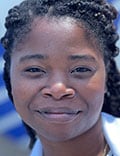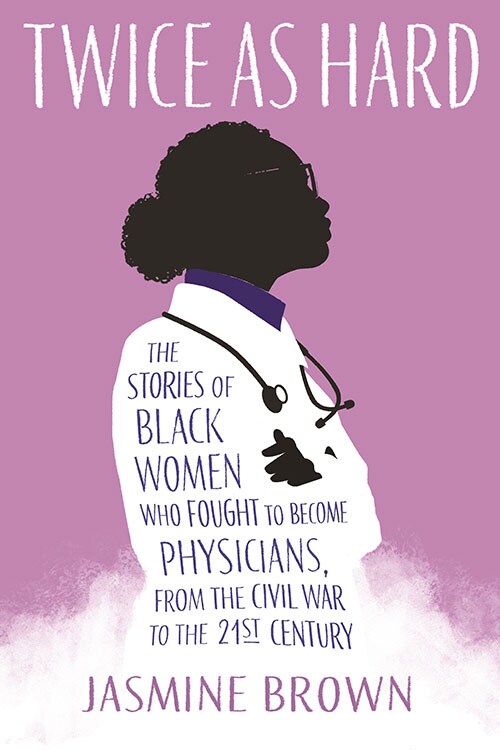New author and medical student Jasmine Brown spoke with Medscape about her recently published book "Twice as Hard: The Stories of Black Women Who Fought to Become Physicians, from the Civil War to the 21st Century." Brown graduated from Washington University in St. Louis, where she studied biology and neuroscience. After college, she was named a Rhodes Scholar and researched the history of medicine at University of Oxford. That research, along with her experiences as a Black woman in medicine and a desire to help her community, fueled her drive to write her book. She is a third-year medical student at the University of Pennsylvania.
Medscape: Why did you write this book and what did you learn from it?

Jasmine Brown
Jasmine Brown: I guess the short version would be, I experienced challenges through my life, like prejudice, and seeing other Black students have those experience made me want to do something about it. I saw the Rhodes Scholarship as an opportunity to dig deeper into the historical roots of 'Where's this coming from?' At Oxford was the first time I met a Black woman physician; meeting her was incredible. Learning the stories of the women in my book…I was just so in awe of all that they had overcome and accomplished despite the obstacles in their way.
I thought about my friends from high school who didn't have the support, didn't have the family in those spaces. As young as elementary school, people were telling me what I was not capable of because I was Black. Classmates telling me you're Black, that means you're stupid. You're not going to do well in school. I just think it's so important to have positive messaging to counter that.
After learning these Black women's stories, I thought they have done so many incredible things, some things that I had not even thought to aspire toward, and how much they were able to overcome. Just seeing that was an encouragement to not preemptively limit myself.
Medscape: What do you hope to accomplish with this book?
Brown: I hope that Black people could learn about these stories and feel encouraged. Despite whatever messaging they might be getting, they can succeed within medicine, or whatever they decide to pursue. By seeing the historical roots of the social and structural barriers that lead to the challenges that we experience now, they will be energized to take action.
Medscape: What has been the reception from classmates and the medical community since the book's release?
Brown: My classmates have been very supportive and excited about it. I've been overwhelmed in a positive way. I went into a bookstore in Philly and my book was right next to Prince Harry's book and it was in the front of the bookstore.

Jasmine Brown's book on Black women physicians. "After learning these Black women's stories, I thought they have done so many incredible things, some things that I had not even thought to aspire toward, and how much they were able to overcome."
Someone sent me this picture of my book at a Barnes and Nobles in upstate New York and it was next to Michelle Obama's. I got chills. When I got that picture, I was sitting on the couch and I had to sit for like 10-15 minutes and didn't move because I was afraid if I moved too fast, I would find out it wasn't real.
The medical community has been really supportive. I will say I have some locks on my social media where I don't see the prejudiced stuff. People said supportive things, but another person said, "Twice as hard? More like twice as easy since like, affirmative action or whatever."
Initially I was hesitant when I gave a talk at (Johns) Hopkins, because in my book I talked about racial segregation specifically at Hopkins. I asked one of the physicians about it ahead of time. I asked, "Will this be taken negatively, this critique of the school's history?" She's like, "No, we want to hear those things. We're very open to it." But also, she was a Black woman.
Medscape: Do you ever feel that you're mostly preaching to the choir with the people who read your book?
Brown: It's been a mix. I've spoken to some women's groups, and I think those spaces are not always as aware of the challenges of Black people. I was actually really moved by one of the leaders of a women's group who was White. She said how moved she was by the book and how she felt like this was a call to action for how much work needed to be done.
Black people are my primary target audience. I want to share this part of history with Black people. We have this incredible legacy and we're not being told it.
Medscape: Why did you decide to study medicine?
Brown: In middle school, I wanted to be a model, lawyer, and a pastry chef. And I figured out a way to do all of these things.
I liked the idea of research, discovering something that no one's ever known before, and being able to understand things that have implications on our health. Medicine just seemed to be a good fit for me. I considered an MD/PhD but the PhD life didn't fully fit with what I wanted. I started looking into other programs and learned about the master's degree in the history of medicine. I wanted to do something to increase the number of Black persons in higher education and in STEM fields.
Medscape: You mentioned in the book that people often imply that your admission to Penn is due to affirmative action. How do you feel about affirmative action?
Brown: In my medical school class of about 160 students, there are 23 Black students. But that's better than a lot of schools.
I'm very pro-affirmative action. While affirmative action is not sufficient, without it I'm very concerned. Because there's so much research that shows if you have the same application, but there's a White sounding name and a Black sounding name, the vast majority of the time, they're going to pick the White sounding name. And so even as people try to say, 'We're in the 21st century, it's 2023, we're beyond these racist issues,' we're not.
In the early 1900s, (the medical education specialist) Abraham Flexner recommended the closing of almost every Black medical school. That halted the growth of Black physicians going into medicine. And he even said it explicitly. He said that Black physicians should only treat Black patients and the fewer Black physicians the better.
There are some students who have said that the Black students at Penn are taking spots from more deserving applicants. We deserve to be in these spaces.
Medscape: Do you ever experience imposter syndrome as a minority student at an elite medical school?
Brown: I know that I earned my spot to get into medical school, but I don't have any family who are physicians. So I think while I'm very comfortable, there still is this apprehension of being fully convinced that I will become a physician. And so I feel like that is probably impostor syndrome. Med school is hard. And I felt like there's all these constant leaps. I've seen people who don't make it through.
Medscape: Advice for new medical students?
Brown: If you don't have anyone that you're close to that's in medicine, there's a lot of new things that can be surprising. It took time getting used to, but by my second year, I was in my groove and comfortable. Then I went into the hospital and worked up to 12 or 13 hours a day. I'd spend multiple hours in the evening studying. So I had to adjust to basically having two jobs of being in the hospital and studying.
Every rotation comes with new skills or a new team dynamic. I've heard people say that clerkship is the hardest year of medical school.
I definitely recommend taking a break. Attending Oxford allowed me to develop this other passion that I have that will impact my career as a whole. I really got time to reflect on what I want my life to look like, think more about who I want to be as a person and just enjoy so many amazing things in the world.
As a pre-med student, you're so used to the grind. If you don't pause, as a young adult, and reflect on what you want your whole life to look like, get experience on what you would kind of be turning down — you spend all of your days and nights in the hospital, and people won't really realize what they're sacrificing.
Medscape: What's next for you?
Brown: Right now the biggest thing is this (USMLE Step 1) test. It's just been really exciting how things are unfolding with my book and seeing it take on a life of its own connecting with people. I'm trying to continue to share the message so that it reaches as many people as it can.
But people have asked me, what's my next book? Right now I'm studying for the exam. After I'm over these next couple of hurdles in medical school, I'll think about it. A book is such a big project that I don't think I would immediately jump into another. It would have to be something I feel called to do.
For more news, follow Medscape on Facebook, Twitter, Instagram, YouTube, and LinkedIn
Credits:
Lead Image: DigitalVision Vectors/Getty Images
Image 1: Mary Brown
Image 2: Penguin Random House
Medscape Medical News © 2023 WebMD, LLC
Send news tips to news@medscape.net.
Cite this: 'Twice As Hard': Medical Student Jasmine Brown Publishes History of Black Women Doctors - Medscape - Feb 28, 2023.









Comments